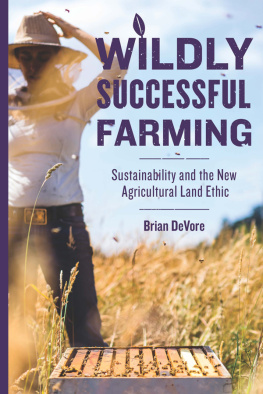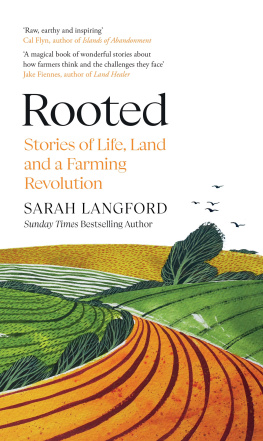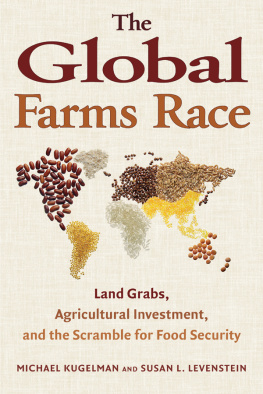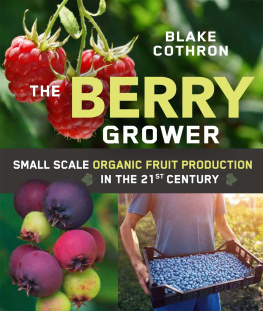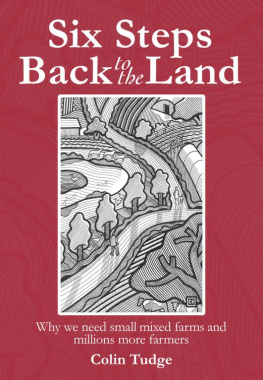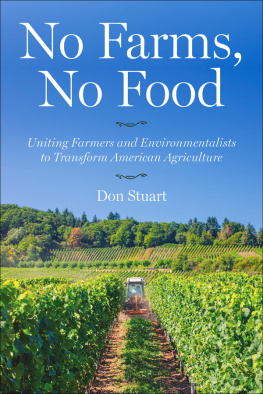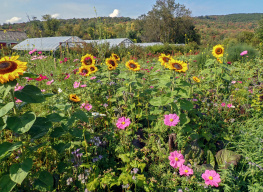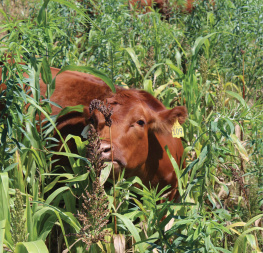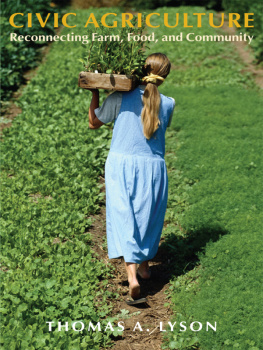All rights reserved. Except in the case of brief quotations embedded in critical articles and reviews, no part of this publication may be reproduced, stored in a retrieval system, transmitted in any format or by any meansdigital, electronic, mechanical, photocopying, recording, or otherwiseor conveyed via the Internet or a website without written permission of the University of Wisconsin Press. Rights inquiries should be directed to .
This book may be available in a digital edition.
Names: DeVore, Brian, author.
Title: Wildly successful farming: sustainability and the new agricultural land ethic / Brian DeVore.
Description: Madison, Wisconsin: The University of Wisconsin Press, [2018] | Includes bibliographical references and index.
Identifiers: LCCN 2018011392 | ISBN 9780299318802 (cloth: alk. paper)
Subjects: LCSH: Sustainable agricultureMiddle West. | Alternative agricultureMiddle West. | AgricultureEnvironmental aspectsMiddle West. | Agricultural landscape managementMiddle West.
Classification: LCC S444 .D48 2018 | DDC 333.76/160977dc23
LC record available at https://lccn.loc.gov/2018011392
Acknowledgments
I owe an incalculable debt to all of the farmers over the years who have invited me into their kitchens, barns, and fields and shared that most precious of commodities: time. They patiently put up with my repeated attempts to gather enough insights to fully understand the complex balancing act of producing food profitably while nurturing a working ecosystem. For every farm described in this book, there are at least two dozen more that could have been included given more time and resources. I only hope Ive come close to communicating the passion with which these wildly successful farmers go about their daily lives. Ive also benefited from the willingness of experts representing various aspects of agriculture, science, economics, and policy to put up with just one more question. For someone who barely passed a basic soils course in college, access to such expertise is a goldmine.
This book would not be a reality if it wasnt for Dana Jackson. Her poking, prodding, questioning and, most important, support, motivated me to pull together my years of reporting and fashion them into a somewhat coherent narrative. But even more important, her belief in my ability to help tell the story of sustainable agriculture can be traced back to 1994, when she hired me as the editor of the Land Stewardship Letter, the official publication of the Land Stewardship Project. That job set me off on a two-decade journey that brought me in touch with some of the most innovative and inspiring farmers Ive ever had the pleasure to meet. Finally, she was generous enough to give a draft of this manuscript the kind of tough-love read it required at the time. Thank you, Dana.
I also want to thank Ron Kroese and the late Victor Ray, who in 1982 had the audacious idea of creating a nonprofit organization dedicatedto the stewardship of working farmland, as well as the people and communities who depend on it for survival. I am grateful and humbled to have had the opportunity to utilize my skills in some small way as a staff member of the Land Stewardship Project and am constantly in awe at the creativity and tenacity of this organizations dedicated staff, board, and membership. To paraphrase Wendell Berry, they pursue their work with joy, even though theyve considered all the facts.
This books title and theme are the result of conversations and many pasture/birding walks Ive had with Art Tex Hawkins, whose ideas about blending the wild and the tame have reinforced what Ive witnessed on farms across the Midwest. His dedication as a public servant who truly cares about the land and the people traces its roots all the way back to Aldo Leopold himself.
And thanks to Gwen Walker, my editor at University of Wisconsin Press, who immediately got what this books title represented. Her enthusiastic support of the original proposal, along with the patient guidance she, Adam Mehring, and the rest of the University of Wisconsin Press provided made it possible to bring these stories to a larger audience. The anonymous reviewers who gave the draft manuscript a thorough and thoughtful reading improved the final version immensely in myriad ways.
My late parents, Earl and Helen DeVore, passed on to me a love of the land and the community that surrounds it, as well as a respect for the hard work that goes into trying to make a living in agriculture. My older siblingsRod, Sheila, Sandy, and Sherryleft behind their books when they departed the farm to start their adult lives; these were priceless hand-me-downs for an awkward kid. Speaking of family, a special thanks to cousins Bobby Dale and Charlotte Groves, who shared food, beer, and good company with me while I was holed up writing for a few weeks on the DeVore farmstead. Thanks for reminding me why farmers do what they do.
Ben and Molly, I apologize for all the nights and weekends that took me away from you while I was traveling from farm to farm, trying to track down yet another story. Returning home to your laughter and curiosity after those reporting trips made it all worthwhile. As you begin the next stage of your lives, I hope you can find your own way to blend the wild and the tame.
Finally, none of this would mean anything without Kathleen. Her fierce support, combined with patience and belief in me, held this projecttogether, even when it looked like it was fated to remain a stack of unorganized field notes. Sometimes we farm boys need a little Boston pushiness to get er done. From the Maloti Mountains to Minnesota, your dedication to racial justice and education has inspired me to pursue my own passions. Kea u rata.
Introduction
A Day on the Farm, a Night on the River
Dan Specht finished up hog and cattle chores, hopped into his pickup truck, and wound his way down to the Mississippi River, just a few minutes drive away from his hilltop farm in northeastern Iowa. He had fishing gear in the back, soil under his fingernails, and nutrient runoff on the mind. That wasnt unusual for Specht. It was difficult for the farmer to separate his various passionseven if they seemed to come into conflict at times.
Im trying to be more efficient in my nutrient cycling, the soft-spoken bear of a man told me that summer evening as he guided the pickup past corn, soybeans, alfalfa, and pastures before hitting the heavily timbered river bottom, which was home to, among other things, the ancient, humped structures of the effigy mound builders culture. The thing is that corn and beans dont create a very complex rotation. Its a very leaky system. Its annual, warm season row crops, and its the middle of June before the roots start picking much up. Before you know it, your drain tile lines are running full of nutrients the whole months of April, May, and June.
There, in one succinct description given during a five-hundred-foot drop in elevation that carried us from the cultivated farmlands to the wild bottoms of the Upper Mississippi, Specht had laid out to me perfectly a problem that touched on plant physiology, soil biology, and hydrogeology. And because his beloved Mississippi flows down to the Gulf of Mexico, where all that nitrogen thats escaping leaky farm fields has

